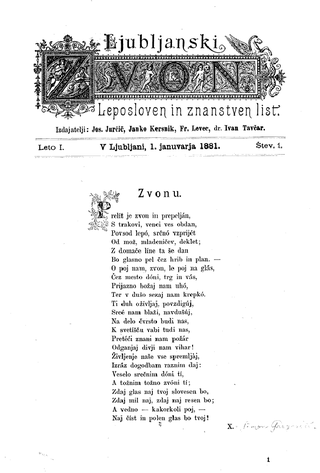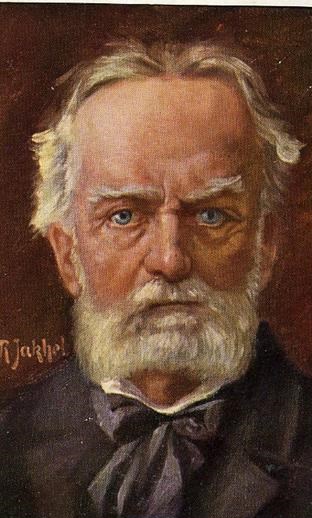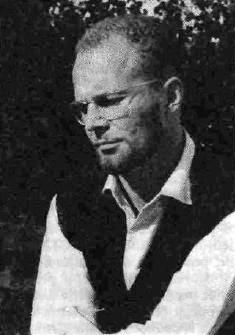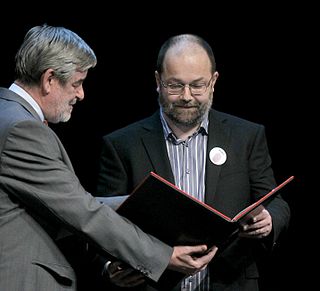
Ivan Cankar was a Slovene writer, playwright, essayist, poet, and political activist. Together with Oton Župančič, Dragotin Kette, and Josip Murn, he is considered as the beginner of modernism in Slovene literature. He is regarded as the greatest writer in Slovene, and has sometimes been compared to Franz Kafka and James Joyce.

Josip Murn, also known under the pseudonym Aleksandrov was a Slovene symbolist poet. Together with Ivan Cankar, Oton Župančič, and Dragotin Kette, he was regarded as one of the beginners of modernism in Slovene literature. After France Prešeren and Edvard Kocbek, Murn was probably the most influential Slovene poet of the last two centuries.

Ljubljanski zvon was a journal published in Ljubljana in Slovene between 1881 and 1941. It was considered one of the most prestigious literary and cultural magazines in Slovenia.

Janez Trdina was a Slovene writer and historian. The renowned author Ivan Cankar described him as the best Slovene stylist of his period. He was an ardent describer of the Gorjanci Mountains and of the Lower Carniolan region of Slovenia. Trdina Peak, the highest peak of Gorjanci Mountains, situated on the border between southeastern Slovenia and Croatia, was named for him in 1923.
Lojze Kovačič was a Slovene writer. His novel The Newcomers is often considered one of the most important Slovene novels of the 20th century and has been translated into German, French, Spanish, English and Dutch.

Kresnik is a literary award in Slovenia awarded each year for the best novel in Slovene of the previous year. It has been bestowed since 1991 at summer solstice by the national newspaper house Delo. The awards ceremony is normally held on Rožnik Hill above Ljubljana where the winner is invited to light a large bonfire. The winner also receives a financial award.

Josip Stritar was a Slovene writer, poet, essayist, the first aesthetic critic, playwright, publisher and translator.

Miloš Mikeln was a Slovene writer, playwright, theatre director and journalist. He served as the president of Slovene PEN and was the initiator of the Writers for Peace Committee, founded in 1984. He was the Committee chairman for the first decade of its existence. The Committee still continue to operate within the fold of PEN International to this day, providing a platform for literary and intercultural dialogue and understanding.

Andrej Hieng was a Slovene writer, playwright and theatre director.

Andrej Ermenc Skubic is a Slovene writer, playwright, and translator.

Katarina Marinčič is a Slovene writer and literary historian. She has a PhD in French literature and teaches and is a member of the Senate at the Arts Faculty at the University of Ljubljana.

Lado Kralj was a Slovene writer, theatre critic and literary historian. From 1987 to 2005 he worked as a professor in comparative literature at the University of Ljubljana. He published and contributed to numerous books on literature and theatre.

Mojca Kumerdej is a Slovene writer, philosopher and critic. She works as the cultural chronicler for the daily newspaper Delo.
The Slovene Writers' Association is a non-profit association of Slovene writers based in Ljubljana.

Jurij Hudolin is a Slovene poet, writer, columnist and translator. He has published a number of poetry collections and novels and is known for the rich language he uses and a rebellious rejectionist stance towards the world.

Rožnik is a hill in the Rožnik District and Šiška District northwest of the Ljubljana city center. Together with Tivoli City Park, it forms Tivoli–Rožnik Hill–Šiška Hill Landscape Park. Extending from Tivoli Park, it is a popular hiking, running, and excursion destination for residents of Ljubljana.

Andrej Blatnik is a Slovene writer, editor, and professor.
The following is a timeline of the history of the city of Ljubljana, Slovenia.

Veronika Simoniti is a Slovenian writer. She studied Italian and French Studies at university, which led her to work for several years as a freelance translator. She started writing scripts and stories at Radio Slovenia. Her first published story “Metuljev zaliv” won first prize in a Literatura magazine competition. Her debut collection of stories was titled Zasukane štorije. It was nominated as best debut of the year in 2006, and it also won Dnevnik newspaper's 2007 Fabula Award.

The Cankar Award is a literary award established in 2019 by the Slovenian PEN, Slovenian Academy of Sciences and Arts, Research Centre of the Slovenian Academy of Sciences and Arts and the University of Ljubljana. It is named after Ivan Cankar, Slovene writer, playwright, essayist, poet, and political activist. The first award was given in 2020. The Cankar Award honours the best original literary work in Slovenia, celebrating genres in which Ivan Cankar excelled. The award initially consisted of a €5,000 prize and a diploma. In 2024 the amount was increased to €7,000.

















